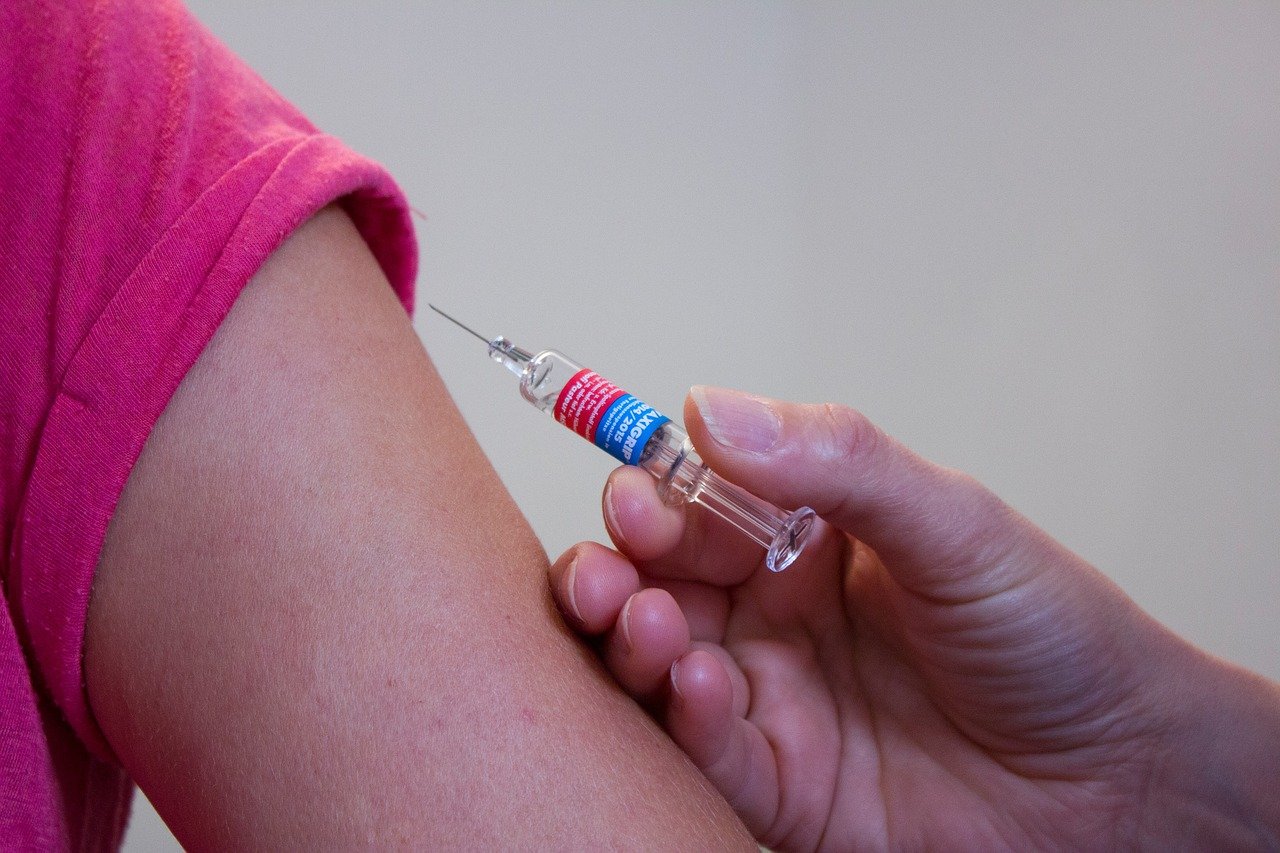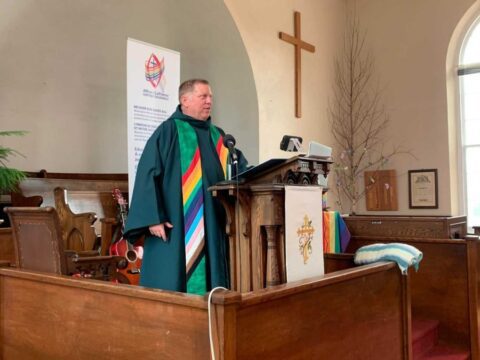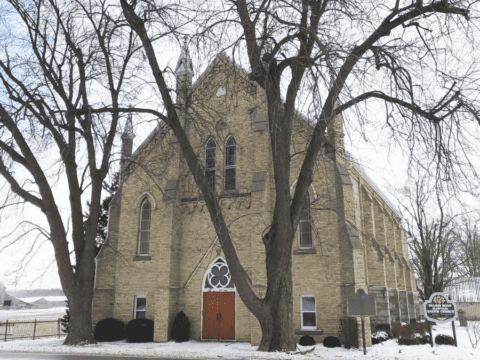Federal public services, health service providers and many large Canadian employers have begun requiring vaccination for employees and clients amid continuing immunization efforts and a fall fourth wave of the COVID-19 pandemic.
The United Church of Canada and its communities of faith, facing a patchwork of COVID-19 regulations across Canada, are unlikely to follow suit.
You may unsubscribe from any of our newsletters at any time.
Proof-of-vaccination programs, or “vaccine passports,” as they’re more commonly thought of, are now being rolled out in British Columbia, Manitoba, Ontario, Nova Scotia, and Quebec, with physical or digital versions either available or coming soon. They allow people who are fully vaccinated to attend non-essential venues such as restaurants, bars and nightclubs, plus large sporting or entertainment events. Once in place, they could also make it easier for faith groups to request proof of vaccination for in-person activities and worship.
So far, the United Church at all levels is urging a cautious approach, while leaving every community of faith to decide its own course of action. For the church as an employer, mandatory vaccination has pitfalls. A legal opinion, released by General Council Office in late June and shared by staff in its 16 Regions, says barring a non-vaccinated employee (like a music director, secretary, or minister) from the workplace (such as a church), could result in a successful claim of “constructive dismissal” and accompanying wrongful dismissal financial damages.
That’s currently not an issue at the church’s Toronto-based General Council Office, which has been closed since March 2020, with only a few employees coming in occasionally for cheque-processing and IT support. Most regional staff have also been largely working remotely. So far, the church has no plans to make vaccination mandatory for them.
More on Broadview:
- 3 pandemic docs that put people under the microscope instead of a virus
- Are churches essential services? Inside the push and pull over pandemic worship
- Why churches like GraceLife embrace pandemic denial
As for communities of faith, most moved worship and meetings online and have allowed ministers to work remotely. Some returned to in-person worship as soon as possible, with masking, physical distancing and hand hygiene in place, after local authorities gave them the green light. But successful mass vaccination drives during last spring and summer suggested a return to past worship practices without measures was possible. Faith leaders were even deemed a priority for early vaccinations in some Ontario municipalities.
With more than 76 percent of Canadians ages 12 and older now fully vaccinated, many congregations are reconsidering in-person worship. General Council executive minister for communications Catherine Rodd says, “The COVID-19 pages on our website have seen a real uptick in traffic during August, when most other pages are quiet, so people are looking for information.”
Information, however, is coming from many different levels. Health and COVID-19 regulations are mainly provincial and territorial matters. Within the United Church, communities of faith follow those regulations while also getting advice on re-opening for in-person worship from Regional Councils. They also need to factor in legal advice from General Council.
Rev. Tricia Gerhard, minister at Sunset United in Regina, is chair of the executive council for Living Skies Region and former member of an ecumenical Saskatchewan COVID-19 advisory group. She is fully vaccinated and encourages people to follow suit, but says “mandatory vaccines make sense health and science-wise, but I am not sure they make sense pastorally.”
“Once we start segregating our communities of faith into vaccinated and unvaccinated, we deepen the grief and trauma that already exists in our communities because of the pandemic – it becomes another way of making worship and community support unreachable.”
On July 11, Saskatchewan lifted all restrictions and encouraged, but not required, government employees to be vaccinated. Churches, like other organizations and institutions in the province, were left to make decisions on COVID-19 regulations for their own congregations.
“I’m sure we will end up having to say … Folks, we really need you to be double-vaxxed to come back in person, and trust that you will be honest.”
Church legal counsel Cynthia Gunn, in a June message, said scriptural guidance should lead congregations to ask, “what is the loving thing to do?” Requiring vaccination in order to attend worship or Bible study could help keep all those in attendance safe. But such a mandate would have to be considered more carefully for those visiting the church for other purposes, such as food, relief or social programs. Gunn couldn’t be reached for more up-to-date comments.
At Halifax’s St. Matthew’s United, the congregation’s clear “open door” policy of “welcoming people regardless of background and social situation, sexual orientation and gender identity…” means mandatory vaccinations are out of the question. “If we’re going to take seriously that essential principle,” says St. Matthew’s minister, Rev. Betsy Hogan, “it’s incumbent on us inside that space, to make sure that people are protected….” That means St. Matthew’s will likely stick to its current policy of mandatory masking and social distancing inside the church.
Gunn’s resource document says churches will also have to consider how to accommodate people who are not, or don’t wish to be vaccinated, how to treat tenants, and how to collect information on vaccine status without violating anyone’s privacy. Rev. Treena Duncan, executive minister for Pacific Mountain Region in B.C. and Chinook Winds in Alberta, says her regions are passing General Council’s legal advice on to communities of faith, but “this is evolving and [we] will adjust as advice and guidance change.”
Since B.C. is putting vaccine cards into place and requires them for all church gatherings other than public worship, requiring proof of vaccination for worship as well might be another step, she says.
Recent posts from ministers on the United Church’s Facebook page point to strong support for vaccination among ministers but an equally strong aversion to policing vaccination of church members, adherents or clients.
The best solution, says Rev. Jeff Doucette, may be including churches — now left to make their own decisions by governments as well as General Council — on the list of places requiring vaccine passports. The minister at Enniskillen-Tyrone United in Tyrone, Ont., says churches were told early in the pandemic to close because they were not essential. But now, churches aren’t being treated like other non-essential services that residents need vaccine passports to access.
‘I don’t understand how a place of worship is any less important’: Religious leaders ask to be included in Ontario’s vaccine certificate https://t.co/5RLmIMU79j
— Toronto Star (@TorontoStar) September 2, 2021
Enniskillen-Tyrone United has held outdoor services in its garden, in tandem with worship broadcasting on Facebook Live. It also brought in a pharmacist for two online education sessions on COVID-19 vaccination, where many concerns were addressed. The community of faith’s board is now considering what approach to take.
“It’s not really about vaccine passports, it’s about how do we keep our people safe,” says Doucette. “I’m sure we will end up having to say … Folks, we really need you to be double-vaxxed to come back in person, and trust that you will be honest.”
Some congregations are already doing that, while keeping masking, social distancing and hand hygiene in place.
Outright anti-vaxxers or even the vaccine-hesitant are hard to find — or keeping a very low profile — in the United Church. Rev. Peter Hartmans, executive minister for Ontario’s Shining Waters and Canadian Shield Regions, says he doesn’t know any ministry personnel in his Regions who opposed vaccination.
“My hope is that mandatory vaccination will not be necessary, as folks who are able to get vaccinated, are vaccinated for their own safety and the safety of others,” he says.
In campaigning for the September federal election, Liberal Leader Justin Trudeau promised protection from legal challenges for groups or businesses who demand proof of vaccination from customers. But that may not be enough to persuade United Church communities.
“This isn’t as straightforward as ‘no shirt, no shoes, no service’ or ‘wear your seatbelt’,” says Gerhard. “We have an obligation to keep our people healthy physically, mentally and spiritually…. But how do we find the balance?”
***
Mike Milne is a writer living in Owen Sound, Ont.














The United Church or the congregation might not want to discriminate by welcoming vaccinated and unvaccinated individuals, but it creates a unsafe space for children under 12 year-old. I understand there is no simple solution. We need to decide what kind of church we want to be and understand the consequences or our decisions.
We may need to re-write some scriptures:
“Come unto me, all ye that labour and are heavy laden and happen to be fully vaccinated, and I will give you rest.”
“Suffer the vaccinated little ones to come unto me — or keep them two metres away if not — for of such is the kingdom of God.”
“Greet the brethren with a holy — er, a properly masked — kiss.” Better to bump elbows.
I believe that the UCc shoukd take a stand that is more positive for all churches to follow. You took this position with same gender marriages and it caused more divisiveness than coheshion. People who were 2SLGBTQIA+ could not easily move from one UCC congregation to another without a lot of deep exploration about whether they were truly welcomed. You are putting the local churches in a similar position regarding the ir vaccine protocol. Not taking a firm stand in favour of having vaccines puts us all at risk, Asking that people have their vaccines promotes a healthy and hospitable faith community that can be compassionate rather than wary of those who are part of it.
Although I agree with your stance, one way or the other you will cause divisiveness. Not all share our views on vaccines and would argue that the UCC is discriminating against “anti-vaxers”.
We have a few “hold-outs” in our congregation, and most won’t give reasons not to get vaccinated, which gives me the impression it is for the wrong reasons, or they hate debates.
Fortunately here in Canada about 85% are in favour, what an issue in the US.
Struggled whether to comment at all.. So, because we might be sued, by somebody, avoiding this is more important than protecting our staff from those who choose not to be vaccinated; although, choosing not to be vaccinated and continuing to work flies in the face of the commandment to love, at the heart of the gospel, as I understand it. By doing nothing seems to me we join the anti- faders and have nothing to say on this important issue.
Vaccine requirements for entry into UCC buildings are a no-brainer. As long as the pandemic flourishes, so must vaccines be present — to keep the unvaccinated safe and to allow those of us who have taken advantage of the free, safe, widely available, and effective vaccines in Canada to get closer to “normal.” The church I serve, Mill Woods United in Edmonton, passed a vaccine requirement on August 23. Those churches who think being inclusive means being opened to the unvaccinated are not thinking clearly, I believe. Shame on the UCC leadership for not being clearer on this. Those who refuse vaccination are in need of counseling about dangerous alt-right ideology; but they should not be allowed to endanger those who want to come in person to activities in church buildings. We don’t allow people who refuse to wear clothes to come to the building, nor those who want to poop on the floor. Why would we let people who refuse to be vaccinated during a pandemic enter? Let’s put our efforts into pushing governments to bring in easy-to-use vaccine documentation and wide, wide vaccine mandates — including in places of worship.
You can’t compare grievous sins with refusing to be vaccinated. As a “Christian” perhaps it would be better to welcome an “anti-vaxer into your church and explain why they should get vaccinated. Unfortunately there are no Scriptures to present as to why they “must” be vaccinated.
If loving them doesn’t work, “forcing” them will not work either. As Christians on either side of the debate, we should be praying that God revoke the pestilence set before the world. We should also be thankful that we are given the ability to find ways to fend off the worst effects of Covid, whether we use it or not.